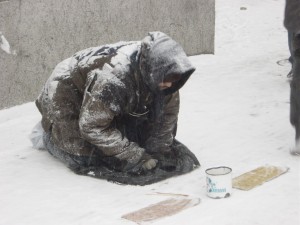
As I was leaving Mass on Sunday, I was surprised to see a man begging near the front entrance of the Church. This doesn’t happen often at our parish, I can probably count the number of times on one hand.
What struck me about this man was that he was on his knees on the concrete. It was hot and sunny, heading toward record-breaking heat. He was there with his physically disabled daughter. He had a sign that got the point across that he had lost his job and needed money or food. As I approached, he stood up and pleaded with me to help in broken English… “anything, anything” he said, “for comida. Food! For familia!”
I helped how I could, but it was alarming to me the number of people that just streamed right past. I tried to explain to the man that he should go and talk to the Father and he would give him food if we had any in the food bank. He thanked me profusely.
As I walked to my car, the urgency of this man’s plea bothered me. I remembered that I had an extra soda in my cooler that I could do without, so I got it and was headed back toward the Church entrance. It bothered me even more to see people clustered in small groups talking, shooting sideways glances and exerting some effort to ignore the situation. A few stopped and gave some change or some sympathy.
As I approached, someone had come out to ask the man to go. It was encouraging that they explained about the parish food bank and that he could call the Church to get some help for his family but nobody could take him in today. I gave the man the soda, which he opened immediately and shared with his daughter as he was sent away from the Church.
Why didn’t more people stop? I understand that many people don’t like to give money because they fear that it would be encouraging some addiction, or they fear getting hustled by someone that “puts on a good act.” I prefer to give someone in this situation the benefit of the doubt. I don’t need the loose change or few dollars in my pocket so bad that I would deny someone kneeling on the hot concrete begging. Compassion and prayers are free. It would have cost nothing but a few seconds to make eye contact with this man and tell him that you would pray for him.
This whole experience reminded me of Deuteronomy 15:7-11:
If anyone is poor among your fellow Israelites in any of the towns of the land the Lord your God is giving you, do not be hardhearted or tightfisted toward them. Rather, be openhanded and freely lend them whatever they need. Be careful not to harbor this wicked thought: “The seventh year, the year for canceling debts, is near,” so that you do not show ill will toward the needy among your fellow Israelites and give them nothing. They may then appeal to the Lord against you, and you will be found guilty of sin. Give generously to them and do so without a grudging heart; then because of this the Lord your God will bless you in all your work and in everything you put your hand to. There will always be poor people in the land. Therefore I command you to be openhanded toward your fellow Israelites who are poor and needy in your land.
I’m not looking for praise for having helped in this situation. This encounter made me really stop and think about how people treat the poor, and I hope that sharing this story will provide an opportunity for reflection. What you would have done? Would have walked by? Ignored the man and his crippled child, judging them as you go past? Would you have offered a prayer or a helping hand?
I am going to remember this man and his daughter for a long time. I pray that this man and his family gets the help that they need.

Marc Barnes’ post on it seems appropriate.